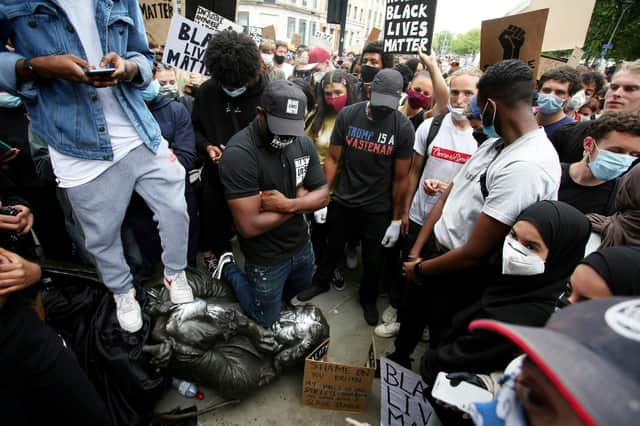s


There is a feeling in many quarters, that this is a long-overdue reckoning.
As the current debate highlights, iconography, especially statues, are deeply symbolic to people and communities, including those designed and created to triumphantly taunt and affront those who experienced imperialism and colonisation, including the extensive exploitations, abuses and misuses of those being subjected to these things.
They considered the ‘spoils of victory’ and glorified commemorations should only ‘go to the victors’.
Advertisement
Hide AdAdvertisement
Hide Ad

History shows that, primarily, the powerful, privileged and the wealthy are ones positioned to decide upon who and what should be celebrated.
Arguments for and against the removal of statues and memorials have been made by various people, including Bristol-reared Sajid Javid MP, where the statute of enslaver Edward Colston was sited and recently thrown into the harbour.
He said: “If Bristolians want to remove a monument, it should be done democratically - not by criminal damage.”
Others argue the defacing and/or removal of statues and memorials is a ‘rewriting of history’.
Advertisement
Hide AdAdvertisement
Hide AdOthers refute this, instead pointing out removal is not a matter of ‘rewriting history’, but making history.
British historian David Olusoga, says: “The toppling of Colston‘s statue is not an attack on history. It is history.”
Others too, in support of the removal of statutes and memorials highlight removal is a refusal to celebrate racist history, including Sadiq Khan, London mayor, who said: “While it’s a sad truth much of our city and nation’s wealth was derived from the slave trade, this does not have to be celebrated in our public spaces.”
In 2007, I was asked to write an accessible, fairer and unfettered reflection and account of the Transatlantic Enslavement of African people and their descendants and the racism they endured, for the national launch of the commemorations of the ‘Abolition of Slavery’.
Advertisement
Hide AdAdvertisement
Hide AdThe result was a publication entitled Racism and Enslavement, which was destined for all UK schools, early years settings, libraries etc.
However, it was, censored and banned from libraries, schools etc. including in Sheffield.
The rationale was the publication gave too much regard to Black abolitionists/resisters, contrary to the preference of establishments and indeed some public authorities, that it should give primary regard to White British abolitionists instead.
The publication was to be given out free of charge to establishments who came under local authorities, but the enforced censorship curtailed this from happening in areas across the UK.
Advertisement
Hide AdAdvertisement
Hide AdThe publication remains relevant, especially in light of the fierce debate going on about Black experience and the ‘censorship’ of history.
It would seem that, on the one hand, certain voices who argue the recent removal of statues and memorials to a racist history is unacceptable censorship were, on the other hand, complicit in censoring, or not speaking up in condemnation of an awareness-raising publication, written at the request of and supported and endorsed by Black communities, regarding the racism and Transatlantic Enslavement of African people and their descendants, being blatantly censored.
Black people’s history is not only their history. Black history is the world’s history. Black experience and Black history did not start with their Transatlantic enslavement.
Black people and nations have long-established, highly developed civilisations.
Advertisement
Hide AdAdvertisement
Hide AdThey have through time, made immense contributions as nations and people to our earth’s development and to the human species, yet this Black history is revised and indeed is non-existent in the national curriculum and other sources of reference, which are the official means of conveying information on the history of Britain and the world here in the UK.
This historical censorship over longevity, I note, has not attracted the same attention and condemnation as the recent removal of statues and memorials to a racist past, which is, in itself, telling.
If statues and memorials are to stay, they should show all realities and not merely be a celebration of a racist past.
It is time to remember the resisters and the oppressed, rather than solely glorifying racist history and oppressors.